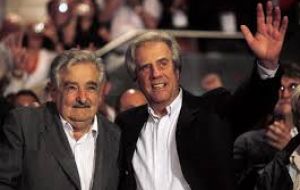MercoPress. South Atlantic News Agency
Uruguay with Pope's blessing to try new approach to human rights and disappeared persons issues
 The idea is to follow the South African experience based on Peace Nobel Prize Desmond Tutu, with “truth and memory” instead of “truth and justice”
The idea is to follow the South African experience based on Peace Nobel Prize Desmond Tutu, with “truth and memory” instead of “truth and justice”  Pope Francis allegedly will provide the umbrella for the reconciliation spirit that should help find the remains of the disappeared
Pope Francis allegedly will provide the umbrella for the reconciliation spirit that should help find the remains of the disappeared  Outgoing Mujica and incoming Vázquez are expected to give their full support to the initiative
Outgoing Mujica and incoming Vázquez are expected to give their full support to the initiative Uruguay will be attempting a new approach to the human rights and disappeared persons issues, a still unfinished legacy from the military dictatorship, (1973/1984) and the decade of armed sedition which preceded the collapse of the country's democracy. The announcement is expected later this month and basically means replacing “truth and justice” for “truth and memory”, following to a certain extent the South African experience.
The initiative under a 'reconciliation spirit' would have a strong 'umbrella' support from Argentine born Pope Francis, whose personal experience under military governments not only means he is knowledgeable but a respected figure who lived through those dark years.
According to Argentine sources close to the issue, a special commission named specifically for that purpose is expected to begin listening to the voluntary confessions from all those allegedly involved in human rights abuses in the period extending from 1963 to 1984, which means military and police officers, civilians and the former guerrillas that somehow helped to bring down what until the late sixties was a dynamic democracy, despite serious economic problems.
Under the South African scheme, proposed originally by Peace Nobel Prize Archbishop Desmond Tutu, confession of the abuses by the culprits who step forward, detailing circumstances of their violent actions and/or orders must also include, among other things where the remains of the victims can be found, addressing the disappeared persons issue.
This is followed by an amnesty for those who confess, which can only be reversed if the data supplied later proves to be false or intentionally misguiding. This apparently helped South Africa move into a quick transition from white to black rule under the leadership of a non vindictive Nelson Mandela, in relative peace and harmony.
However the same way there is no single pattern for military coups, there is no single pattern to deal with the consequences of decades of authoritarian or totalitarian rule. In South America while Argentina, Chile and Uruguay have charged and jailed many of the military and police officers involved in human rights violations, the same can't be said of Paraguay, and even more importantly Brazil where a 1979 Amnesty law, with equal pardon conditions for both sides, has sealed the look into the recent past, except for a report from a truth commission, which is considered controversial and rejected by retired military.
In the case of Uruguay, applying the South African idea of confession (truth) and memory, instead of truth and justice, which has reached a dead end since those allegedly involved who come up and report where the missing were buried or disappeared, face formal charges, won't be easy given the record of the current Broad Front coalition governments.
In effect the Uruguayan electorate in the 1989 and 2009 referenda supported what is known as the 'caducity bill' voted in Congress which allows certain investigations into the past but falls short of condemning those involved, except for the very cruel cases and when children were involved. Caducity refers to the fact that the Uruguayan government drops prosecution into crimes committed during the 1963/1984 period.
However despite the repeated result with a twenty year span, the Broad Front, a catch-all coalition with an arch extending from communists, anarchists and former guerrillas to Social Democrats and Christian Democrats tried to ignore the contents of the caducity bill appealing to its absolute majority in the Legislative.
The first time the amendments to the bill were thrown out by Uruguay's Supreme Court which labeled them 'unconstitutional' but triggered a strong reaction from groups of radicals who rampaged the court's seat. In a second attempt and taking advantage of the absolute majority, the bill was simply derogated opening the way for the trials against military and police officers involved in 'imprescriptibly' human rights abuses during the exceptional rule period.
Argentine sources point out that given these circumstances, and understandable fear of the potential confessors for lack of guarantees, here is where Pope Francis comes in with his umbrella in support of the reconciliation (and guarantee) crusade that confessions conditions will effectively be complied, and the region can definitively begin to turn the page and look ahead.
Apparently former Spanish magistrate Baltasar Garzón, an expert in human rights is also be involved in the initiative. Despite Garzon's prestige among human rights issues it must be recalled that he had to resign as magistrate for having 'bugged' the phones of some fellow magistrates and for wanting to ignore Spain's amnesty law, by calling former General Francisco Franco officials to declare for alleged crimes against humanity.
Since in the Spanish civil war of the thirties over a million people were killed and a couple million more has to leave the country, and was followed by a dictatorship that lasted until 1975/76, the Spanish amnesty law is a holy grail, nobody tampers with it.
This nevertheless did not impede Cristina Fernandez from contracting Baltasar Garzón as a consultant on his specific discipline and to help with the thousands of documents recovered from the dark years of the Southern Cone military rule delivered by Uruguay, Brazil, Chile, Paraguay and Argentina, amassed in the former Mechanics School of the Argentine Navy in downtown Buenos Aires in an attempt to sort out events of those terrible years, and even why not, possibly rewrite recent history.
Uruguay given its solid institutions and democratic system could play a test role in the reconciliation crusade, and according to results could then be tried for example in Brazil.
The announcement of this initiative in Uruguay is expected for sometime this month, thus giving it the support of outgoing president Jose Mujica and incoming Tabare Vazquez who takes office March first. Mujica has repeatedly asked for Uruguay to look ahead, not forgetting the past, while Vazquez tried unsuccessfully during his first period to launch a reconciliation initiative.
The commission coordinating the initiative in Uruguay includes a couple of historians and the former wife of the current Defense minister Eleuterio Fernandez Huidobro, who has been much criticized by human rights groups for some remarks regarding the civil demands and money involved in disappearance claims.
Fernandez Huidobro together with Mujica were among the original founders of the guerrilla movement Tupamaros in the sixties, and had good connections with the military of the time, despite armed clashes, because both agreed in the need to end with the “corrupt contaminated and rotten political system” of that time.
But the story had an unpleasant end: when the Uruguayan military had most of the guerrillas and their logistics identified and saw them come out in support of a test coup in February 1973, they proceeded to the real takeover four months later, June 1973, and stayed on until 1984.




Top Comments
Disclaimer & comment rules-

-

-

Read all commentspope should resign.
Feb 05th, 2015 - 07:07 am 0Several things here:
Feb 05th, 2015 - 10:31 am 01) WHY did Uruguay end up with military rule: because the terrorist Tupas, now the Broad Fraud, attempted to unseat a duly elected government just because the failed lawyer Sendic decided to.
2) If the Military are to be raked over yet again are the Tupas going to suffer the same? No, I didn’t think so.
3) When are these people who want this nonsense going to stop blaming the military to the exclusion of all other miscreants and get on with what remains of their lives which hopefully (as far as I am concerned) won’t be much and we can ALL move forward.
As for the fucking pope, he can piss off and stop interfering.
Truth and JUSTICE.
Feb 06th, 2015 - 09:33 am 0The memory wont fade.
Nunca más!
Commenting for this story is now closed.
If you have a Facebook account, become a fan and comment on our Facebook Page!